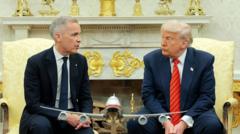If enacted, the comprehensive tax bill is set to escalate conflicts between the U.S. and other nations, particularly targeting foreign companies.
Republican Tax Legislation Threatens New Global Trade Disputes

Republican Tax Legislation Threatens New Global Trade Disputes
The proposed Republican tax legislation could instigate fresh tensions with international trade partners as global tax norms face upheaval.
The ongoing battle for tax regulations has taken a new turn as Republicans in Congress, influenced heavily by the Trump administration's stance, pursue a sweeping tax bill that may spark international fallout. This new legislation aims to retaliate against foreign nations that attempt to enforce a global minimum tax previously agreed upon by G7 countries.
Since President Trump's tenure began, he has notably resisted the 2021 framework championed by the Biden administration to reform global corporate tax rates. This framework established a floor of 15% for taxes on major corporations, intended to curb tax avoidance by multinational entities.
The current Republican proposal, dubbed the One Big Beautiful Bill Act, seeks to impose increased tax liabilities on foreign firms operating in the U.S. These additional costs would target businesses from countries that implement the global minimum tax or impose higher taxes on American firms. Specifically, the bill could raise tax rates for such "discriminatory foreign countries" by as much as 20 percentage points. The definition of "unfair foreign taxes" within this context is broad, granting the U.S. considerable power to introduce new tax measures.
This impending tax conflict is likely to dominate discussions among finance ministers from the G7 nations who are convening in Canada over the coming days. Tensions over tax policies have been simmering since the aftermath of Trump’s trade wars, and this new legislation threatens to escalate these disputes.
"Every nation has the right to dictate their tax policies according to their interests," remarked Canadian Finance Minister François-Philippe Champagne when questioned about America's objections to Canada's digital service taxes, hinting at potential retaliatory measures.
Should the legislation pass, it could redefine economic relations and fuel a heated debate over tax practices on a global stage, showing a distinct departure from consensus-driven approaches sought in recent years.






















